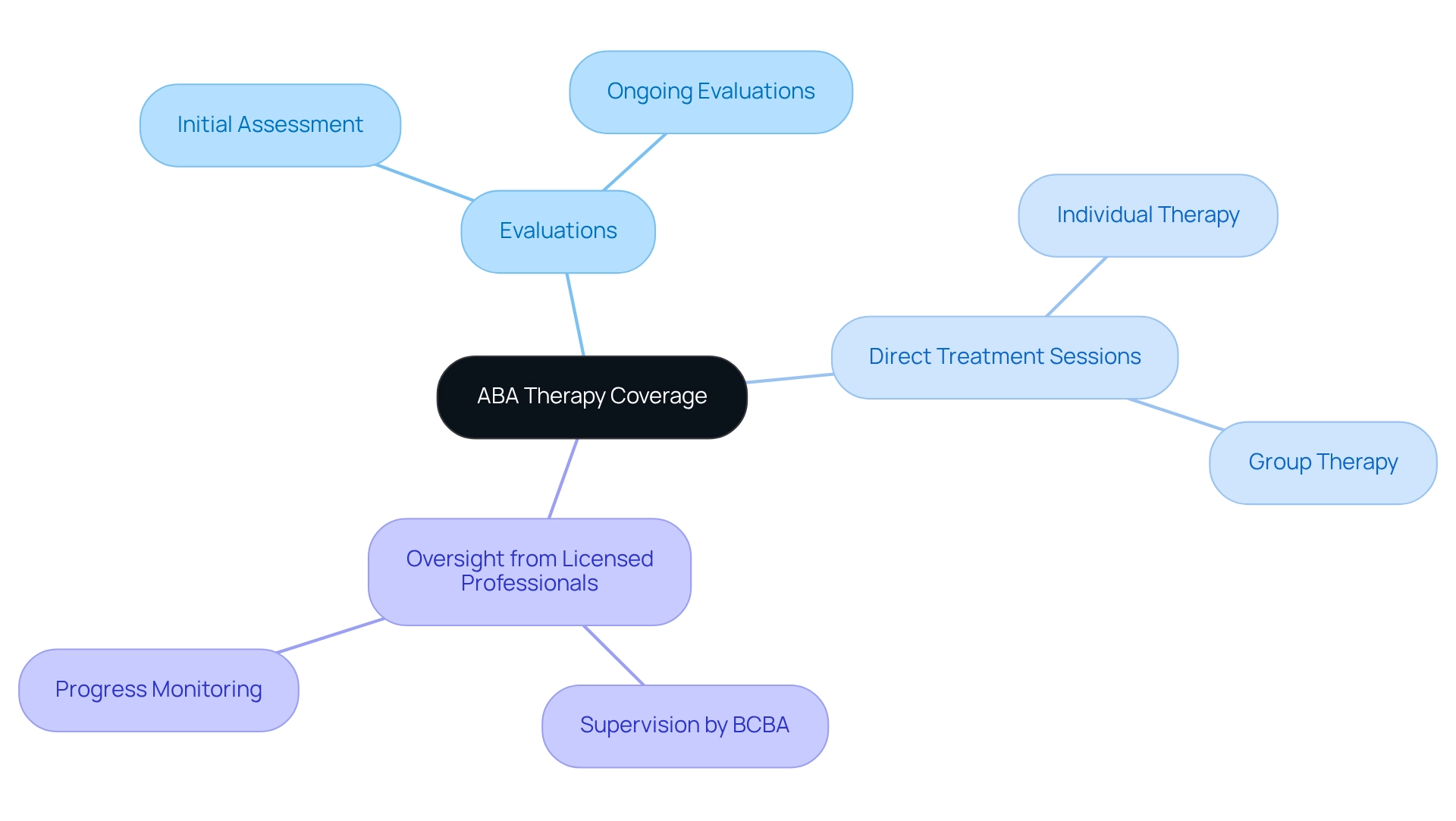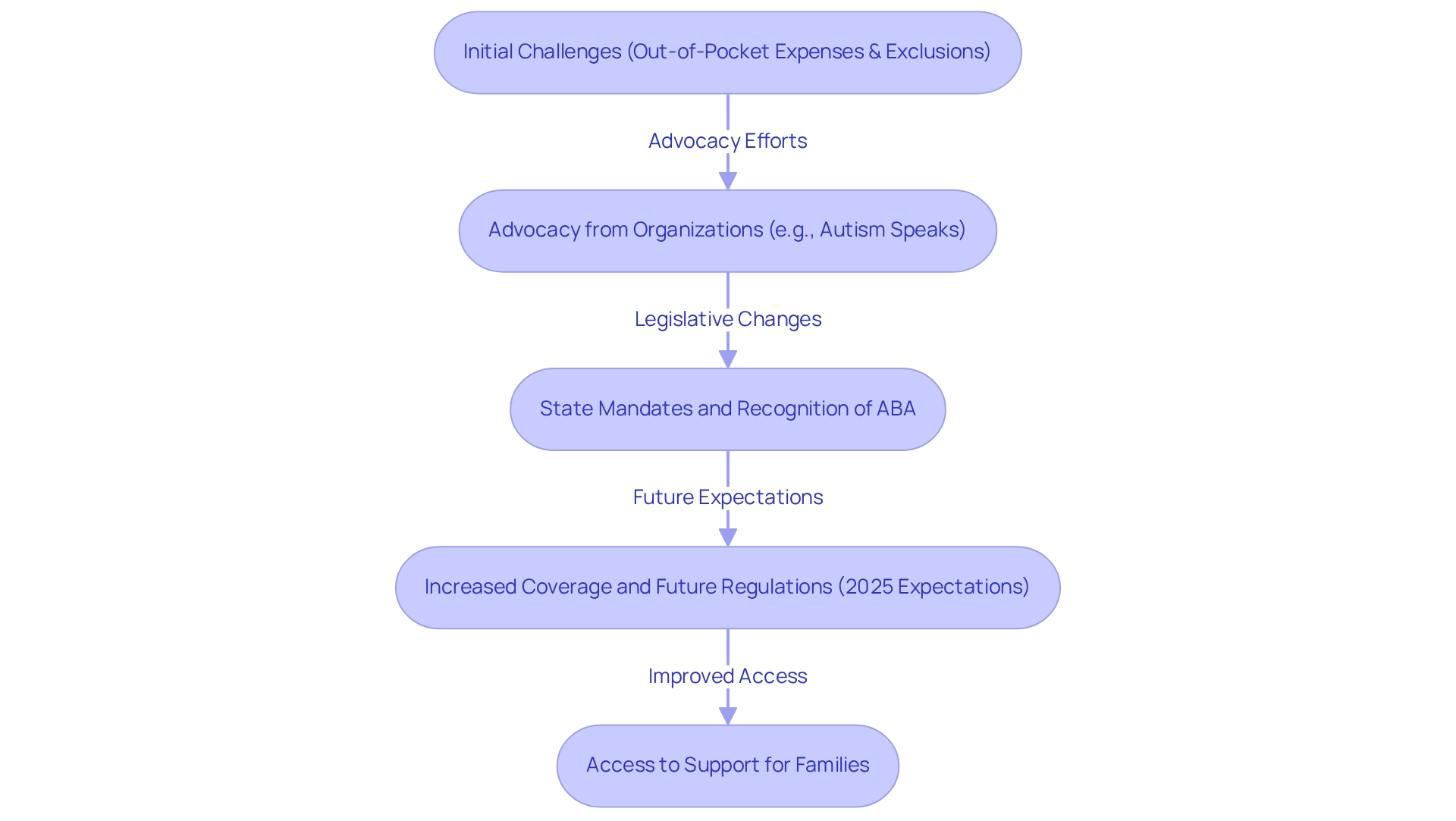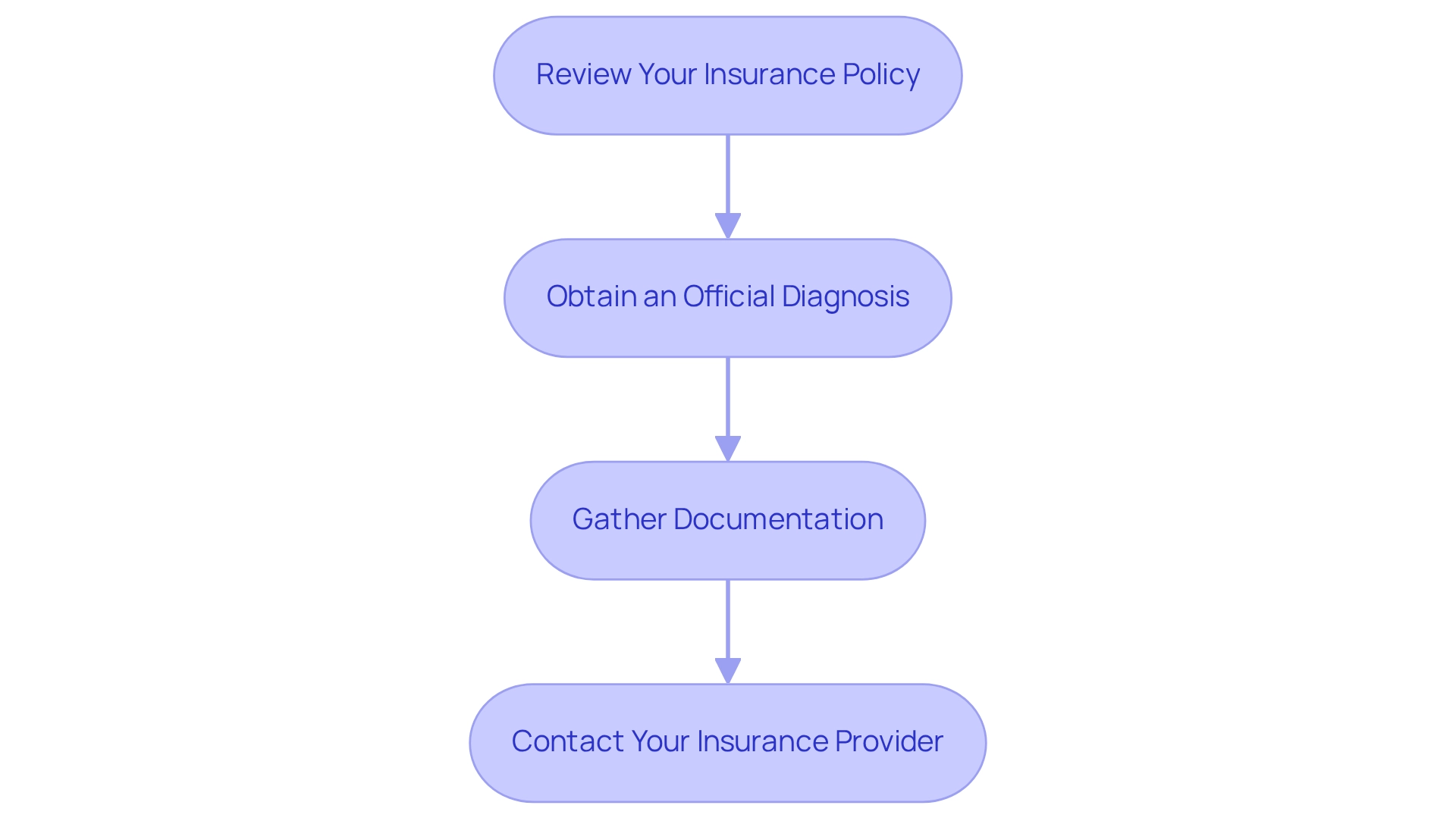Overview
Navigating the world of insurance can be overwhelming, especially when it comes to securing ABA therapy for your child. It's important to know that while ABA therapy is often covered by insurance, the specifics can vary significantly based on your provider and state regulations. Understanding your individual insurance plan is crucial.
Parents often face challenges in this process, but there are steps you can take to ensure your child receives the necessary support for autism treatment:
- Start by obtaining an official diagnosis, which is a key requirement for coverage.
- Then, take the time to carefully review your policy details.
This proactive approach can make a significant difference in accessing the therapies your child needs.
Remember, you are not alone in this journey. Many parents have walked this path and found ways to navigate the complexities of insurance. Consider reaching out to support groups or online communities where you can share experiences and gather insights. Together, we can work towards ensuring that every child receives the care they deserve.
Introduction
Navigating the complexities of insurance coverage for ABA therapy can feel overwhelming for many families. As awareness of autism spectrum disorder (ASD) increases, it becomes even more vital to grasp the nuances of insurance plans that encompass Applied Behavior Analysis. The landscape of ABA therapy insurance is ever-evolving, marked by changes in coverage mandates and specific requirements that parents must meet. This article explores the essential aspects of ABA therapy coverage, offering insights designed to empower parents. By understanding these intricacies, families can effectively advocate for their children's needs and secure the support crucial for their development.
Define ABA Therapy Coverage
It is crucial for parents of children with autism spectrum disorder (ASD) and other developmental disabilities to understand if ABA therapy is covered by insurance. This coverage refers to how health plans compensate for services related to Applied Behavior Analysis (ABA), leading to the inquiry of whether ABA therapy is covered by insurance, which can be vital in supporting your child's development. Typically, coverage includes:
- Evaluations
- Direct treatment sessions
- Oversight from licensed professionals
However, it’s important to determine if ABA therapy is covered by insurance, as specifics can vary significantly between different coverage providers and state regulations. This variability can be overwhelming, making it essential for you to thoroughly understand your individual plan. By doing so, you can ensure that your child receives the support they need. If you have questions or concerns, don't hesitate to reach out to your health plan for clarification. You're not alone in this journey, and there are resources available to help you navigate these complexities.

Context and Evolution of ABA Therapy Coverage
The journey of ABA treatment coverage has undergone a remarkable transformation over the past few decades. Initially, many families faced the burden of significant out-of-pocket expenses, as they questioned whether ABA therapy is covered by insurance due to numerous coverage options excluding this treatment. This created a challenging landscape for those seeking support for their children.
Thankfully, advocacy from organizations like Autism Speaks, combined with various state mandates, has begun to change this narrative. As a result, ABA is increasingly recognized as an effective treatment for autism, and looking ahead to 2025, many states are stepping up by implementing regulations to clarify if ABA therapy is covered by insurance.
This shift not only highlights the growing acknowledgment of ABA's importance but also reflects a compassionate understanding of the needs of children with autism and their families. It’s a step toward ensuring that all families have access to the support they deserve.
If you are navigating these changes, consider reaching out to local advocacy groups or support networks to stay informed and empowered in your journey.

Key Characteristics of Insurance Coverage for ABA Therapy
For parents, navigating the financial aspects of ABA treatment can be overwhelming, particularly in understanding if ABA therapy is covered by insurance and the key characteristics of financial protection. One important aspect is the requirement for a formal diagnosis of autism spectrum disorder, which is essential for accessing services. Additionally, many plans necessitate prior authorization for these services, and there are often stipulations regarding the number of treatment hours that may be covered, which raises the question of whether ABA therapy is covered by insurance, as this protection can vary based on your child's age. Some plans may impose restrictions on the number of treatment hours available or limit the benefits you can receive each year, leading to inquiries about whether ABA therapy is covered by insurance. This can create added stress for families trying to ensure their child receives the necessary support.
Understanding these financial characteristics is crucial for parents. By being informed, you can effectively advocate for your child's needs and work towards securing the services they require. Remember, you are not alone in this journey—many parents share similar experiences, and together, we can navigate these challenges. If you have questions or need support, don't hesitate to reach out to local resources or community groups that can offer guidance.

Navigating Insurance for ABA Therapy: Practical Steps for Parents
Navigating the complexities of policies to understand if ABA therapy is covered by insurance can feel overwhelming for parents, but there are practical steps you can take to secure the support your child needs.
- Start by carefully reviewing your insurance policy. It is vital to understand the details of your coverage, including any exclusions or limitations, to determine if ABA therapy is covered by insurance.
- Obtaining an official diagnosis from a qualified expert is crucial, as this often serves as a prerequisite for reimbursement.
- Gathering documentation of the recommended treatment plan and any assessments conducted is equally important. These documents will help you present a strong case to your insurance provider.
- Finally, don’t hesitate to reach out to your insurance provider directly. Clarifying coverage details and obtaining pre-authorization for services can significantly streamline the process and help you avoid unexpected costs.
Remember, you are not alone in this journey. Many parents face similar challenges, and sharing your experiences can foster a supportive community. If you have questions or need additional resources, consider reaching out to local support groups or online forums where you can connect with others who understand your situation.

Conclusion
Understanding the intricacies of insurance coverage for ABA therapy is crucial for families navigating the challenges associated with autism spectrum disorder. It’s important to grasp what ABA therapy coverage entails and to recognize the evolving context of its acceptance within health insurance plans. Informed advocacy is vital in this landscape, which has changed significantly, with many states now mandating coverage—a testament to the increasing recognition of ABA therapy's importance.
Key characteristics such as the need for a formal diagnosis, prior authorization, and specific limits on treatment hours highlight the complexities parents face. However, by being proactive—reviewing insurance policies, securing necessary documentation, and communicating directly with insurance providers—families can enhance their chances of obtaining the support their children need.
While the path to securing ABA therapy coverage may be fraught with challenges, knowledge truly is power. By understanding the nuances of their insurance plans, parents can effectively advocate for their children's needs, ensuring they receive the essential services that support their development and well-being. Empowerment through knowledge not only benefits individual families but also contributes to a broader movement advocating for the rights and needs of children with autism. Together, we can create a supportive community that uplifts and champions the needs of our children.
Frequently Asked Questions
What is ABA therapy and why is it important for children with autism spectrum disorder (ASD)?
ABA therapy, or Applied Behavior Analysis, is a treatment method that helps support the development of children with autism spectrum disorder (ASD) and other developmental disabilities by using behavioral techniques to encourage positive behaviors and skills.
Is ABA therapy covered by insurance?
Coverage for ABA therapy can vary significantly between different insurance providers and state regulations. It is important for parents to check their individual health plan to determine if ABA therapy is covered.
What services related to ABA therapy are typically covered by insurance?
Typically, insurance coverage for ABA therapy includes evaluations, direct treatment sessions, and oversight from licensed professionals.
How can parents find out if their insurance covers ABA therapy?
Parents should thoroughly review their individual health plan and reach out to their health insurance provider for clarification regarding coverage for ABA therapy services.
What should parents do if they have questions or concerns about ABA therapy coverage?
Parents should not hesitate to contact their health plan for any questions or concerns they may have regarding ABA therapy coverage, as there are resources available to help navigate these complexities.




